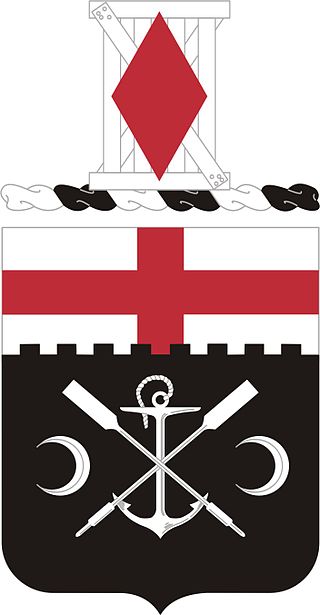
The 63rd Infantry Division was an infantry division of the United States Army that fought in Europe during World War II. After the war it was inactivated, but later the division number and shoulder sleeve insignia were authorized for use by the 63rd Army Reserve Command (ARCOM).

The 16th Military Police Brigade is a military police brigade of the United States Army headquartered at Fort Liberty, North Carolina. This brigade has the only airborne-qualified military police units in the U.S. Army, outside of the 82nd MP Company of the 82nd Airborne Division. It provides law enforcement and police duties to Fort Liberty, and for the XVIII Airborne Corps when deployed. As a brigade with organic airborne units, it is authorized a beret flash and parachute wing trimming, and the shoulder sleeve insignia was authorized to be worn with an airborne tab. According to U.S. Army's Institute of Heraldry, the shoulder sleeve insignia "was amended to delete the airborne tab effective 16 October 2008" when jump status of the brigade was terminated; however, various elements of the brigade remain on jump status.

The 22d Corps Signal Brigade is a US Army Signal Brigade located at Joint Base Lewis–McChord, Washington.
The 49th Quartermaster Group was a United States Army Forces Command (FORSCOM) combat service support unit stationed at Fort Gregg-Adams, Virginia. The group motto was "Fueling the Force." Reactivated in 1993, the 49th held an inactivation ceremony at Fort Lee on 14 September 2012. Its subordinate 530th Support Battalion and 108th Quartermaster Company were reassigned to a brigade headquarters to await their own inactivation in September 2013. According to an article in the post newspaper, "The 54th and 111th, the Army's only active duty mortuary affairs units, are not likely to be inactivated but may be transferred. If any of the units remain at Fort Lee, they may be realigned under battalions either at Fort Eustis, home of the 7th Sustainment Brigade, or Fort Bragg, N.C., home of the XVIII Airborne Corps, the 49th's current higher headquarters."

The 172nd Infantry Brigade was a light infantry brigade of the United States Army stationed at Fort Wainwright, Alaska and later moved its headquarters to Grafenwöhr, Germany. An active duty independent brigade, it was part of V Corps and was one of five active-duty, separate, brigade combat teams in the U.S. Army before its most recent inactivation on 31 May 2013.

The 35th Corps Signal Brigade is a signal brigade in the United States Army. The brigade is based at Fort Liberty, North Carolina, and provides rapidly deployable force projection signal support, and rapid communications for Army, joint, and combined Operations. On 23 April 2007, the 35th Signal Brigade relocated to Fort Gordon, Georgia.

The 3rd Signal Brigade of the United States Army was an element of III Corps. It was based at Fort Hood, Texas, but was inactivated on 15 April 2008 as part of the transformation of the U.S. Army to a Modular Force Structure. The 3rd Signal Brigade has a history of inactivations and reactivations ever since formation of the unit in 1946.

The 189th Infantry Brigade is an Infantry brigade of the United States Army based at Joint Base Lewis-McChord, Washington. It is a training brigade subordinate to First Army.

The 56th Artillery Command is a two-star command of the United States Army that serves as the Force Field Artillery Headquarters for U.S. Army Europe and Africa, with a mission to synchronize, integrate, and control fires and effects in support of the theater land component. The unit was originally formed on September 14, 1942, as the 56th Coast Artillery Brigade and has been reorganized and redesignated several times until its inactivation on June 30, 1991, following the reunification of Germany and the end of the Cold War.

The 18th Field Artillery Brigade is the XVIII Airborne Corps field artillery brigade, based at Fort Liberty, North Carolina.
The 25th Signal Battalion is a strategic signal battalion (SSB) of the United States Army. The battalion is one of two permanently assigned to the 160th Signal Brigade.

The 261st Theater Tactical Signal Brigade is a unit in the Delaware Army National Guard, with a home station in Smyrna, Delaware. The 261st Theater Tactical Signal Brigade provides command and control to assigned and attached units. The 261st Signal Brigade supervises the installation, operation, and maintenance of up to 16 NODES in the theater communications system excluding the division and corps systems. The brigade also hosts a Joint Command, Control, Computer and Communications (C4) Center, or JCCC, at its headquarters in Smyrna, Delaware.
The 210th Field Artillery Brigade, also known as "the Thunder," is a U.S. Army field artillery brigade forward deployed in the Republic of Korea. Its mission is "On order, 210th Field Artillery Brigade provides fires in support of ACC Operations and Ground Component Commander's (GCC’s) counter fire fight. On order, transitions to offensive operations." It provides fire support for Eighth United States Army. The brigade is based at Camp Casey, Republic of Korea and its assets include the M270A1 Multiple Launch Rocket System (MLRS).

The 51st Infantry Regiment is a regiment of the United States Army first established in 1917.

The 58th Infantry Regiment is a regiment of the United States Army first established in 1917.

The 7th Engineer Battalion is a unit of the United States Army located at Fort Drum, New York. This battalion falls under the 10th Mountain Division's 1st Brigade Combat Team. The battalion has the Brigade Combat Team's engineer companies, military intelligence company, and signal company.

The 51st Signal Battalion is a United States Army unit which is part of the 22d Corps Signal Brigade located at Joint Base Lewis–McChord, Washington. Its mission is to rapidly deploy worldwide to engineer, install, operate, maintain, and defend the LandWarNet in support of full spectrum operations. The battalion deployed to Iraq in 2003 – 2004 and in 2008 – 2009 and sent elements to Afghanistan in 2010 and 2011. The unit was deployed as of January 2015, and 2019.

The 525th Expeditionary Military Intelligence Brigade (Expeditionary) is a unit of the United States Army specializing in the acquisition and analysis of information with potential military value. On 28 October 2014, the unit was reflagged from the "525th Battlefield Surveillance Brigade" to an expeditionary military intelligence brigade, the first of its kind.

The 55th Support Battalion was a unit of the United States Army, which was last active from 9 July 1982 to 15 June 1991.
The 72nd Field Artillery Brigade is an AC/RC unit based at Joint Base McGuire-Dix-Lakehurst, New Jersey. The unit is responsible for training selected United States Army Reserve and National Guard units along the East coast. The brigade is a subordinate unit of First Army Division East, First United States Army.

















